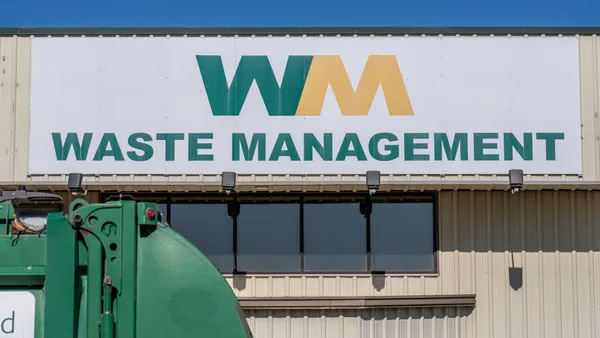Dive Brief:
- The waste and recycling industry is beginning to modify work and travel policies in response to the new coronavirus, officially declared a pandemic by the World Health Organization (WHO) on Wednesday. Alterations include work-from-home policies, limiting non-essential work travel, and canceling or postponing some events.
- Given the rapidly changing situation, companies have taken a range of approaches. A Republic Services spokesperson told Waste Dive company operations remain "fully functional" and per guidance from the Centers for Disease Control and Prevention (CDC) it is not canceling U.S. personal or business travel at this time. By contrast, Joe Fusco, vice president for Casella Waste Systems, said the company is recommending "we avoid holding or attending meetings in excess of ten participants," among other measures.
- The Solid Waste Association of North America (SWANA) announced on Thursday it would be postponing SWANApalooza, scheduled to be held in Atlanta at the end of March, to a later date. "The health and safety of attendees, speakers, exhibitors, and staff must be our top priority," CEO David Biderman wrote in an email to attendees. The Institute of Scrap Recycling Industries has now suspended its April convention in Las Vegas well.
Dive Insight:
The new coronavirus, which causes the disease COVID-19, has industries around the world on alert as they brace for fallout. According to Johns Hopkins University as of publishing time, more than 127,000 cases of COVID-19 have been reported, with more than 4,700 deaths worldwide. At this time, 1,323 people have reportedly tested positive in the United States and 38 have died.
Some companies told Waste Dive they are still in the process of finalizing and working out response plans while others have yet to share any details.
Fusco acknowledged the "very rapidly evolving challenge globally" posed by the virus and said Casella is eyeing contingency plans should the situation worsen. The company is looking into postponing some meetings, embracing remote and electronic alternatives, and breaking up some planned gatherings (such as safety meetings) into smaller groups at different times.
Covanta had no major events planned, according to spokesperson James Regan, but the company has instituted travel restrictions as a cautionary measure. A remote work policy has not yet been enacted. "We are following guidance from the CDC and other health agencies and will move to remote work when warranted," he said.
Asked about operational effects, Regan said Covanta's "primary focus is on the health and wellbeing of our employees and the communities we serve," but that "we have a team in place working to limit any potential impacts." Other companies noted similar contingency plans to continue operations, as well as ongoing communication with local authorities.
California-based Recology told Waste Dive it is taking steps similar to other companies. Danielle Gambogi, the company's communications and sustainability manager, said Recology is advising canceling or limiting all non-essential work travel, in addition to canceling or making remote some internal events. Administrative offices also have a voluntary remote work policy, which many employees are opting into. Recology has also temporarily closed its San Francisco container redemption centers "as a precautionary measure" meant to protect employees, Gambogi said.
Amanda Pratt, director of corporate communications for Ohio-based Rumpke Waste and Recycling, said the company does not accept or handle medical waste, which is shaping its approach, as is CDC advice. Rumpke is using "external communication platforms" to remind MSW generators to appropriately bag curbside waste. While there are no travel restrictions in place, Pratt said "public landfill and recycling plant tours through April 2020" have been suspended.
Stericycle, meanwhile, already had many standard contingency plans in place that have helped the company navigate the outbreak. Jennifer Koenig, a vice president with the company, told Waste Dive Stericycle has additionally banned all travel to high-risk countries, and limited business travel generally to ensure safety.
"We have [also] provided and updated, per regulatory developments, packaging guidelines for regulated medical waste and sharps to effectively manage containment of waste and minimize occupational exposure risk, and we continue to support our healthcare customers during this critical time," Koenig said.
Waste Management, WCA Waste, and Waste Pro did not make information available about their response plans as of publishing time. Waste Connections and GFL Environmental did not respond to requests for comment.
Meanwhile, industry conferences and events remain in a state of flux. WasteExpo has been postponed until August. The Southeast Recycling Conference and the first-ever National Zero Waste Conference, among other events, have been canceled or suspended. As recently as Wednesday both SWANApalooza and ISRI 2020 were still scheduled, but that has since changed. In some cases event organizers are looking at virtual options or alternate dates later in the year.
Another mounting concern is potential impacts to workers handling the waste stream, who may come into contact with contaminated items. SWANA and the National Waste and Recycling Association, as well as some local waste department officials, have indicated they do not feel the coronavirus poses an elevated risk to workers.
Testing done by the U.S. government and other scientists has found the virus can live on some surfaces for as long as three days, including plastics and stainless steel. The scientists have emphasized their work does not prove anyone has been infected through aerosolized transmission.
Additional reporting by Cole Rosengren. This article was updated on March 12 to include comment from Stericycle.










